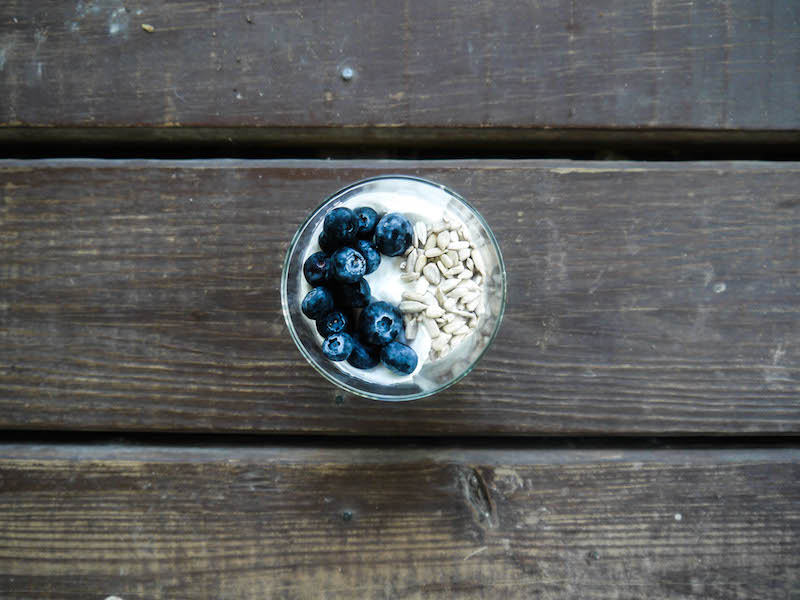 A shelf in my kitchen has, over the past few months, been transformed into a miniature fermentation lab. Just about every week a new jar of sauerkraut or slaw is added to the line up, along with more recent experiments in beet kvass and water kefir. But the easiest and most delightful of all, is the weekly batch I make of dreamy, creamy, coconut yogurt.
A shelf in my kitchen has, over the past few months, been transformed into a miniature fermentation lab. Just about every week a new jar of sauerkraut or slaw is added to the line up, along with more recent experiments in beet kvass and water kefir. But the easiest and most delightful of all, is the weekly batch I make of dreamy, creamy, coconut yogurt.
Let it be known that I love yogurt–cow milk and goat milk and sheep milk alike. That said, I’ve discovered that allergy season and daily dairy intake just don’t mix for me, so I watch with mild envy as Pete gulps down glasses of kefir or cuts himself a slice of cheese. Lucky, I mutter into my handkerchief.
After a bit of research, I found a few different methods for making coconut yogurt. I had seen coconut yogurt on the shelf at the grocery store but their ingredient labels read like an inventory list for a science lab and that sneaky ingredient, sugar, usually found itself towards the top of the list. I wrote it off as nothing more than a faux food replacement created by nefarious food companies to make a buck off of vegans. (Yeah, I’m cynical.) And while that could still be true, the homemade version is comprised of only two ingredients, is packed with probiotic goodness, and is so very delicious, whether you’re dairy free or not.
If you aren’t already clued in to the importance and power of probiotic rich foods, here is a good primer. For even more information on healthy microbes and general immune health, check out this, and this. You may even decide you want to contribute to this fascinating project. Whether you dive into these extracurricular reading materials or not, here is the take away– You can take a probiotic pill every day, but, as with all vitamins, I encourage you to try to get them from your food instead of from a pill. Go to the source. My personal experience is that 2 tablespoons of raw fermented vegetables (or coconut yogurt or beet kvass or kefir) each day has done more for my health than a daily probiotic pill ever did. Plus, it tastes better. So your tastebuds, as well as your local bacteria population, will thank you.
Give this simple recipe a try and let me know what you think. I’ve been eating mine plain, or topped with berries and seeds, or added to a smoothie to make it a real meal. It’s naturally sweet enough and certainly rich enough that I bet it would make a delicious dessert with raw cacao and cinnamon stirred in and maybe a drizzle of olive oil. Yes please.
Coconut Yogurt
makes 2-4 servings
1 can full fat coconut milk
2 probiotic capsules
1 quart-sized mason jar or other glass container with a tight fitting lid
-Pour the coconut milk into a bowl and empty the probiotic capsules into the milk. Use a whisk to combine the ingredients well, breaking up any clumps in the coconut cream. You can also place the ingredients directly into the jar, secure the lid, and shake really well until all the clumps are dissolved.
-Pour the milk into a very clean jar or glass container and screw on the lid. Place in a warm location (mine is on a shelf in the kitchen). You want it to be at least 70 degrees in the room where you place the jar. Let sit for 3-5 days. You can take the lid off after a couple of days to smell, or even taste the yogurt. When it takes on the texture of yogurt and has a nice tangy smell, it is ready.
-Store in the fridge for 5-7 days…..though I suspect you will eat it faster than that.
Note: I have had variations in my batches depending on the coconut milk. If you get a can that is more coconut cream than liquid, you may find that your yogurt separates during fermentation and requires shaking before eating which will make it more of a coconut kefir than a solid yogurt. Other batches have been thick and creamy like Greek yogurt or Skyr.
Second Note: From a probiotic standpoint, this is a great swap for dairy-based yogurt. It is not, however, a completely even swap with dairy-based yogurt as far as macronutrients are concerned. There is less protein and more fat in coconut yogurt than in cow’s milk yogurt. That said, for many people, coconut yogurt will be far easier to digest which means reduced inflammation, improved metabolic performance, and a generally smoother running system. Remember that one man’s medicine is another man’s poison so just pay attention to how you feel after eating certain foods, try to remain curious, and do what works for you.
p.s. I promise my next recipe will not contain coconut 🙂


 Subscribe via RSS
Subscribe via RSS